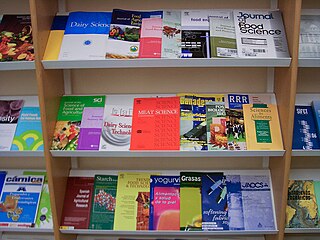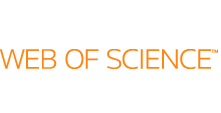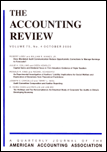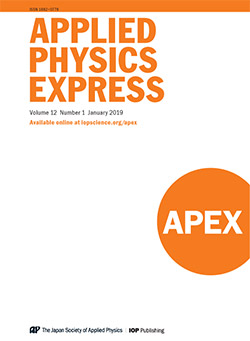Related Research Articles

An academic journal or scholarly journal is a periodical publication in which scholarship relating to a particular academic discipline is published. Academic journals serve as permanent and transparent forums for the presentation, scrutiny, and discussion of research. They are usually peer-reviewed or refereed. Content typically takes the form of articles presenting original research, review articles, or book reviews. The purpose of an academic journal, according to Henry Oldenburg, is to give researchers a venue to "impart their knowledge to one another, and contribute what they can to the Grand design of improving natural knowledge, and perfecting all Philosophical Arts, and Sciences."
College and university rankings are rankings of institutions in higher education based on combinations of various factors. None of the rankings give a comprehensive overview of the strengths of the institutions because all select a range of quantifiable characteristics to base their results on. Rankings have been conducted by magazines, newspapers, websites, governments, and academics. In addition to ranking entire institutions, organizations rank programs, departments, and schools. Rankings consider various combinations of measures of funding and endowment, research excellence and/or influence, specialization expertise, admissions, student options, award numbers, internationalization, graduate employment, industrial linkage, historical reputation and other criteria. Various rankings mostly evaluating on institutional output by research. Some rankings evaluate institutions within a single country, while others assess institutions worldwide. The subject has produced much debate about rankings' usefulness and accuracy. The expanding diversity in rating methodologies and accompanying criticisms of each indicate the lack of consensus in the field. Further, it seems possible to game the ranking systems through excessive self-citations or by researchers supporting each other in surveys. UNESCO has questioned whether rankings "do more harm than good", while acknowledging that "Rightly or wrongly, they are perceived as a measure of quality and so create intense competition between universities all over the world".
Scopus is Elsevier's abstract and citation database launched in 2004. Scopus covers nearly 36,377 titles from approximately 11,678 publishers, of which 34,346 are peer-reviewed journals in top-level subject fields: life sciences, social sciences, physical sciences and health sciences. It covers three types of sources: book series, journals, and trade journals. All journals covered in the Scopus database are reviewed for sufficiently high quality each year according to four types of numerical quality measure for each title; those are h-Index, CiteScore, SJR and SNIP. Searches in Scopus also incorporate searches of patent databases.
The impact factor (IF) or journal impact factor (JIF) of an academic journal is a scientometric index calculated by Clarivate that reflects the yearly mean number of citations of articles published in the last two years in a given journal, as indexed by Clarivate's Web of Science. As a journal-level metric, it is frequently used as a proxy for the relative importance of a journal within its field; journals with higher impact factor values are given status of being more important, or carry more prestige in their respective fields, than those with lower values. While frequently used by universities and funding bodies to decide on promotion and research proposals, it has recently come under attack for distorting good scientific practices.

Dalton Transactions is a peer-reviewed scientific journal publishing original (primary) research and review articles on all aspects of the chemistry of inorganic, bioinorganic, and organometallic compounds. It is published weekly by the Royal Society of Chemistry. The journal was named after the English chemist, John Dalton, best known for his work on modern atomic theory. Authors can elect to have accepted articles published as open access. The editor is Andrew Shore. Dalton Transactions was named a "rising star" by In-cites from Thomson Scientific in 2006.

Analytical Chemistry is a biweekly peer-reviewed scientific journal published since 1929 by the American Chemical Society. Articles address general principles of chemical measurement science and novel analytical methodologies. Topics commonly include chemical reactions and selectivity, chemometrics and data processing, electrochemistry, elemental and molecular characterization, imaging, instrumentation, mass spectrometry, microscale and nanoscale systems, -omics, sensing, separations, spectroscopy, and surface analysis. It is abstracted and indexed in Chemical Abstracts Service, CAB International, EBSCOhost, ProQuest, PubMed, Scopus, and the Science Citation Index Expanded. According to the Journal Citation Reports, it has a 2019 impact factor of 6.785 and is the top analytical chemistry journal ranked by h-index in the SCImago Journal Rank. The editor-in-chief is Jonathan V. Sweedler.
Australian Systematic Botany is an international peer-reviewed scientific journal published by CSIRO Publishing. It is devoted to publishing original research, and sometimes review articles, on topics related to systematic botany, such as biogeography, taxonomy and evolution. The journal is broad in scope, covering all plant, algal and fungal groups, including fossils.

Web of Science is a website that provides subscription-based access to multiple databases that provide comprehensive citation data for many different academic disciplines. It was originally produced by the Institute for Scientific Information (ISI). It is currently maintained by Clarivate.

The Accounting Review is a bimonthly peer-reviewed academic journal published by the American Accounting Association (AAA) that covers accounting with a scope encompassing any accounting-related subject and any research methodology. The Accounting Review is one of the oldest accounting journals, and recent studies considered it to be one of the leading academic journals in accounting.

Journal of Chemical Theory and Computation is a peer-reviewed scientific journal, established in 2005 by the American Chemical Society. It is indexed in Chemical Abstracts Service (CAS), Scopus, British Library, and Web of Science. The current editors are William L. Jorgensen and Gustavo E. Scuseria. Currently as of the year 2015, JCTC has 11 volumes.
Scientia Iranica is a peer-reviewed scientific journal published by Sharif University of Technology. It was established in 1991 and covers theoretical and experimental research in technical sciences and engineering. Starting in 2011, the journal is published open access. The editor-in-chief is Abolhassan Vafai.

The ORCID is a nonproprietary alphanumeric code to uniquely identify authors and contributors of scholarly communication as well as ORCID's website and services to look up authors and their bibliographic output.

Applied Physics Express or APEX is a scientific journal publishing letters, with usually no more than three pages per (concise) article. The main purpose is to rapidly publish original, timely, and novel research papers in applied physics. As part of its aim, the journal intends for papers to be novel research that has a strong impact on relevant fields and society. It is notable that the journal considers satisfaction of this criterion as showing the paper merits priority handling in the review and publication processes. In keeping with this aim, its issues are published online on a weekly basis. The print version is published monthly.
The European Journal of Personality (EJP) is the official bimonthly academic journal of the European Association of Personality Psychology covering research on personality, published by SAGE Publishing. According to citation reports based on impact factor, the journal ranked seventh of all the empirical journals in the social-personality field. EJP seeks to promote the development of empirical and theoretical work in personality psychology. It publishes papers relevant to advancing the field of personality in the broadest sense, and encompasses topics such as the nature of personality, expressions of personality in a social context, personality development, and the consequences of personality. EJP also publishes work on methodological advances in research on personality. It is abstracted inservices including PsycINFO and Social Sciences Citation Index.

Gifted Child Quarterly is a peer-reviewed academic journal covering the field of education. The journal's editors-in-chief are Jill L. Adelson of the Duke University Talent Identification Program and Michael S. Matthews of the University of North Carolina at Charlotte. The journal was established in 1957 and is published by Sage Publications in association with the National Association for Gifted Children.
Open Geosciences is a peer-reviewed open-access scientific journal covering all aspects of the Earth sciences. It is published by De Gruyter and the editor-in-chief is Piotr Jankowski. The journal was established in 2009 as the Central European Journal of Geosciences, co-published by Versita and Springer Science+Business Media. In 2014, the journal was moved to De Gruyter. It obtained its current name in 2015, when it became open-access.

Combinatorics, Probability and Computing is a peer-reviewed scientific journal in mathematics published by Cambridge University Press. Its editor-in-chief is Béla Bollobás. The journal covers combinatorics, probability theory, and theoretical computer science. Currently, it publishes six issues annually. As with other journals from the same publisher, it follows a hybrid green/gold open access policy, in which authors may either place copies of their papers in an institutional repository after a six-month embargo period, or pay an open access charge to make their papers free to read on the journal's website.
The Open Energy Modelling Initiative (openmod) is a grassroots community of energy system modellers from universities and research institutes across Europe and elsewhere. The initiative promotes the use of open-source software and open data in energy system modelling for research and policy advice. The Open Energy Modelling Initiative documents a variety of open-source energy models and addresses practical and conceptual issues regarding their development and application. The initiative runs an email list, an internet forum, and a wiki and hosts occasional academic workshops. A statement of aims is available.
Implementation Science is an open access peer-reviewed academic journal in healthcare that was established in 2006. It focuses on studies of implementation research from the clinical, biomedical, social and health services sciences, as well as contributions on methodology and theory, selected reviews, essays, and invited editorials. The editors are Michel Wensing and Paul Wilson. In 2018, the journal had an impact factor of 4.525, placing it #11 out of 98 journals in the category Healthcare Sciences & Services.
References
- 1 2 Taylor & Francis, Issue particulars of the European Accounting Review. Retrieved 2015-10-26.
- 1 2 European Accounting Association, EAR - European Accounting Review. Retrieved 2015-10-28.
- 1 2 "Master Journal List". Intellectual Property & Science. Thomson Reuters. 2015-06-01. Archived from the original on 2017-09-26. Retrieved 2015-08-16.
- ↑ "Content overview". Scopus. Elsevier . Retrieved 2015-08-16.
- ↑ SCImago, Ranking of European Accounting Review.
- ↑ "European Accounting Review". 2018 Journal Citation Reports. Web of Science (Social Sciences ed.). Thomson Reuters. 2018.